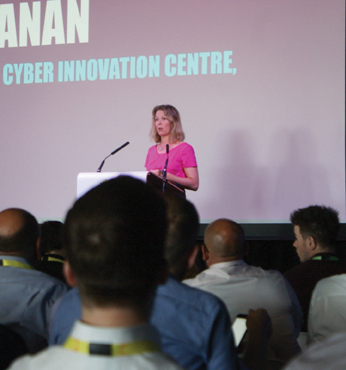A new centre, the London Office for Rapid Cybersecurity Advancement (LORCA), was officially opened on Tuesday by Matt Hancock, Secretary of State for Digital, Culture, Media and Sport (DCMS). The centre will be run by Plexal, the east London innovation centre on the Here East digital and creative campus, developed and owned by Delancey’s DV4 fund. LORCA is being delivered with audit firm Deloitte’s cyber team and the academic Centre for Secure Information Technologies (CSIT) at Queen’s University Belfast.
LORCA’s aim is help UK cybersecurity firms across all stages of growth. Its first cohort includes B-Secur which specialises in using biometric heartbeat solutions as a means of authentication, as well as for health and wellbeing. Lloyds Banking Group will be the first founding partner.
Plexal, which operates London’s largest innovation space and specialises in helping high-tech startups in artificial intelligence, augmented reality and the Internet of Things, will run the £13.5m innovation centre in Plexal City at Here East, on the site of Queen Elizabeth Olympic Park.
Lydia Ragoonanan, pictured, Director of LORCA, said: “The threats posed to businesses by cyber attacks are continually changing. We’re proud to be working with industry to understand their needs, with investors who can help develop and scale the solutions at pace, and with incredible innovators who are helping secure UK’s position as a world leader in cyber security. By bringing all these things together in our new centre we will stay ahead and help British businesses grow and succeed.”
Matt Hancock said: “Britain’s future prosperity will be based on its digital technology and no technology can work without cyber security so expanding this sector is critical to our future. It’s fantastic to open this new centre where some of our most talented entrepreneurs and innovative companies will develop the cyber security technology of tomorrow. This will boost London’s booming tech sector and benefit businesses across the country. We are investing £1.9 billion to protect the nation from cyber threats, have introduced new laws to strengthen our defences, and developed a wealth of free help and guidance for businesses available through our National Cyber Security Centre.”
For the minister’s speech in full visit the DCMS website.
Also speaking earlier were Gavin Poole, CEO, Here East; Stephen Wray, Director of Cyber Innovation at Deloitte; Dr Godfrey Gaston, CSIT Director; and on the centre’s mission, former head of GCHQ, Robert Hannigan. Rounding off the afternoon, a panel discussed cyber security: Sian John MBE, Executive Security Advisor, Microsoft; Stuart Murdoch, Founder and CEO, Surevine; and Dr Rachel O’Connell, Founder and CEO, Trust Elevate.
The centre’s opening coincided with LORCA-commissioned research that suggests more than half of large businesses have suffered a cybersecurity attack in the last 12 months, and almost a quarter of UK businesses (24pc) don’t think their cybersecurity solutions are fit for their needs. That study of 500 UK C-level executives found that more than half (53pc) do not have a formalised protocol in place for cyber attacks.
Most breaches or attacks are via fraudulent emails – such as trying to coax staff into revealing passwords or financial information or opening dangerous attachments. Despite this, a majority of businesses (70pc) surveyed said they haven’t purchased a cybersecurity solution from a startup company or SME in the last two years. The reasons why they might not seek external specialist help depend on the size of the company: the largest proportion of SMEs (37pc) chose awareness of the solution as the key challenge when implementing a new and innovative solution to cyber threats. This contrasts to larger companies surveyed, where integration concerns were considered the most significant barrier (47pc).
Comment
Haroon Malik, Director of Cyber Security Consulting at Fujitsu UK and Ireland commented: “The opening of a new cyber innovation centre is a hugely positive move and will be invaluable as the nation looks to defend the UK from the evolving threat of attacks. With our latest report revealing that a fifth of the UK public believe cybercrime and hacking are the biggest challenges facing the UK today, the country has an obligation to make cyber resilience and data protection as much of a priority as the public, who are regularly asked to hand over financial and other personal data.
“The good news is that, for the majority of organisations, cybersecurity is becoming a top level priority, but the reality is that many firms still struggle to put in place the right measures to safeguard employees, customers and the broader business against attacks. Organisations should adopt a two-pronged approach by complementing employee training and awareness with continued investment in technical and security controls. In doing so, businesses can be on the front foot for proactively identifying and managing threats instead of waiting for breaches to happen.
“Because even the best-run company could suffer from a hack or data breach, it’s encouraging to see that steps are being taken to continue strengthening the UK’s cybersecurity capabilities. After all, cybercrime is not a probability, it is an inevitability and it will be the way in which we prepare for it that can make all the difference.”










